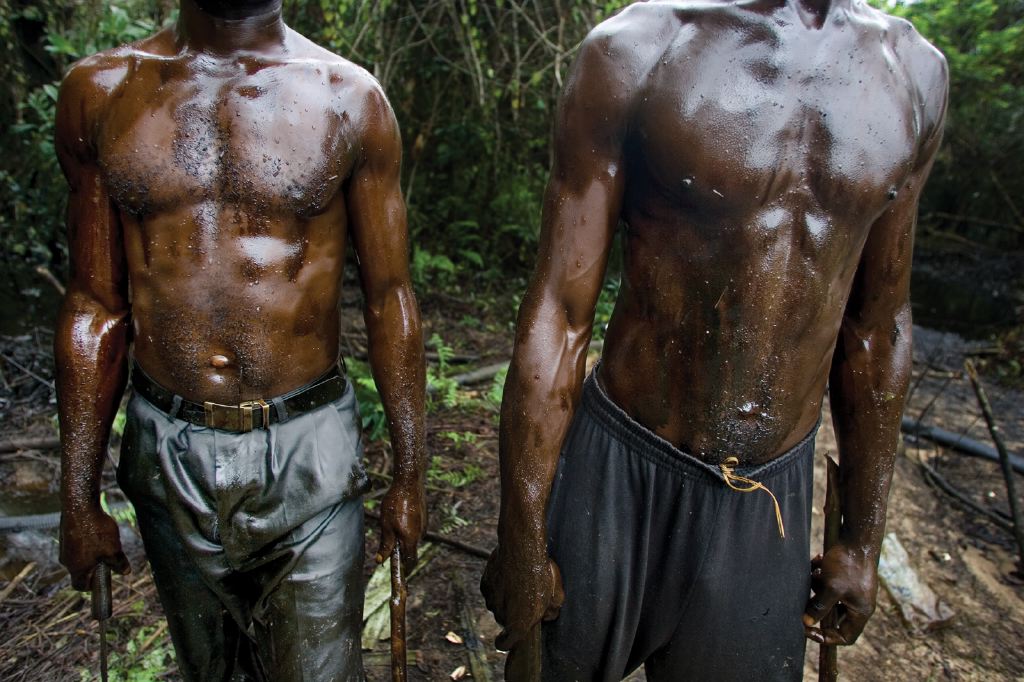Elisabeth Rosenthal reminds us that while it seems like a big deal to Americans when a giant oil disaster spreads a vast slick across our waters, we seem not to care much when the oil is spilled in somebody else’s waters by our companies supplying Nigerian oil for 40% our current consumption:
But it is important to remember that this mammoth polluting event, so extraordinary here, is not so unusual in some parts of the world. In an article published Sunday in The Guardian of London, John Vidal, the paper’s environment editor, movingly recalls a trip to the Niger Delta a few years ago, where he literally swam in “pools of light Nigerian crude.”
A network of decades-old pipes and oil extraction equipment in the delta has been plagued by serious leaks and spills. “More oil is spilled from the delta’s network of terminals, pipes, pumping stations and oil platforms every year than has been lost in the Gulf of Mexico,” he writes.
[…]
Here in the United States, people express outrage at BP’s actions in the gulf and demand that the oil giant behave responsibly in our waters. But should they also insist that oil companies behave well in the developing countries where their oil comes from? After all, many people insist on “fair trade” coffee and non-sweatshop clothing.
One more excerpt from Mr. Vidal’s fascinating article: “If this gulf accident had happened in Nigeria, neither the government nor the company would have paid much attention,” said the writer Ben Ikari, a member of the Ogoni people. “This kind of spill happens all the time in the delta.”
Where eleven employees of British Petroleum were killed in the initial explosion on the Deepwater Horizon rig in April, frequent pipeline explosions in the Niger Delta region (sometimes caused by rebels) often kill a hundred or more people at a time, many simply too close at the time. As John Vidal explains in his article, the ensuing spills and leaks destroy crops, pollute drinking water, and kill vital fish stocks. Companies such as Shell and Exxon usually take their light sweet time about fixing the leaks, sometimes springing from ancient pipes that just rusted away. And until the relative recent democratization of the country, anyone who pointed this out faced the possibility of the death sentence from a government getting fat off American oil money. Even now, villagers report attacks from security guards if they get too vocal, while Shell claims villagers prevent them from making repairs to try to get more compensation money. Yeah right.
How much is being spilled or is leaking? Well, right now there are about 300 incidents a year, and that has added up over the decades.
One report, compiled by WWF UK, the World Conservation Union and representatives from the Nigerian federal government and the Nigerian Conservation Foundation, calculated in 2006 that up to 1.5m tons of oil – 50 times the pollution unleashed in the Exxon Valdez tanker disaster in Alaska – has been spilled in the delta over the past half century. Last year Amnesty calculated that the equivalent of at least 9m barrels of oil was spilled and accused the oil companies of a human rights outrage.
According to Nigerian federal government figures, there were more than 7,000 spills between 1970 and 2000, and there are 2,000 official major spillages sites, many going back decades, with thousands of smaller ones still waiting to be cleared up. More than 1,000 spill cases have been filed against Shell alone.
Last month Shell admitted to spilling 14,000 tonnes of oil in 2009. The majority, said the company, was lost through two incidents – one in which the company claims that thieves damaged a wellhead at its Odidi field and another where militants bombed the Trans Escravos pipeline.
As stated above, the United States gets 40% of its oil from the Niger Delta right now, and Nigeria is now the third-largest American supplier nation, beating out Saudi Arabia. You should care about this. (Further reading, with incredible photos, here.)
The Gulf of Mexico’s Deepwater Horizon catastrophe is definitely bad, but we need to stop drilling for oil everywhere and change the whole world to clean energy soon… not just the United States. So many reasons to do it, and this is just one more.
 |
| Caption: An oil spill from an abandoned Shell Petroleum Development Company well in Oloibiri, Niger Delta. Wellhead 14 was closed in 1977 but has been leaking for years, and in June of 2004 it finally released an oil spill of over 20,000 barrels of crude. Above: Workers subcontracted by Shell Oil Company clean it up. photo & caption by Ed Kashi, via citisven |
This post originally appeared on Starboard Broadside.


